
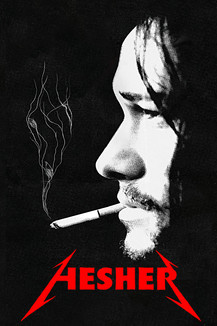
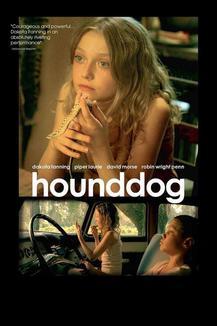


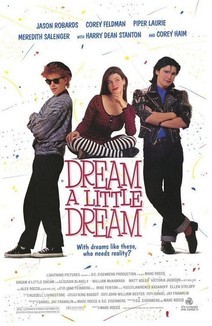
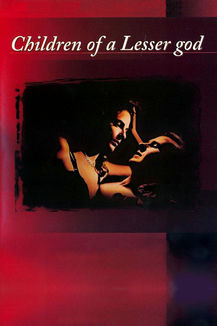
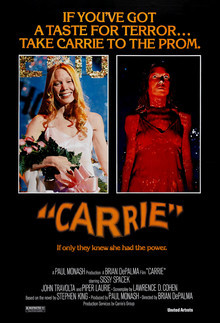
Matt writes: On October 7th, the world lost one of its greatest filmmakers when Terence Davies passed away at age 77.
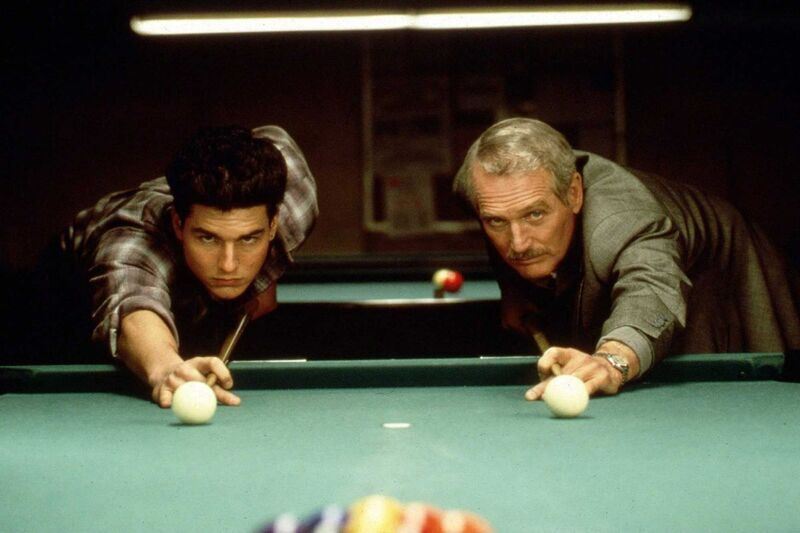
An FFC takes another look at one of the few arguable missteps in the career of Martin Scorsese.

A feature on the history of female swashbucklers.

A Far Flung Correspondent takes a look at the Paul Newman classic The Hustler.

A celebration of Brian De Palma's "Carrie" on the occasion of its 40th anniversary and a new Collector's Edition Blu-ray from Shout! Factory.
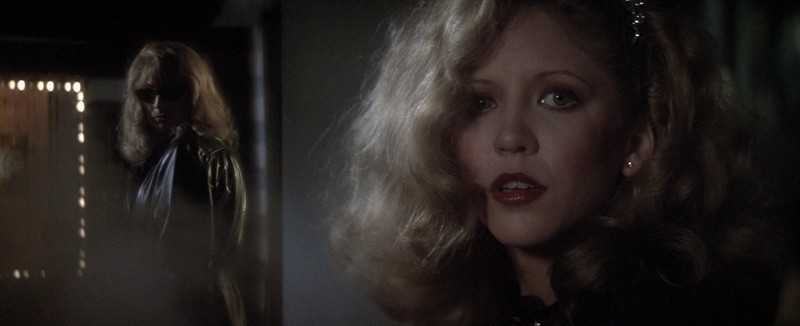
A look back at the Brian De Palma film "Dressed to Kill," celebrating its 35th anniversary with a new Criterion release.
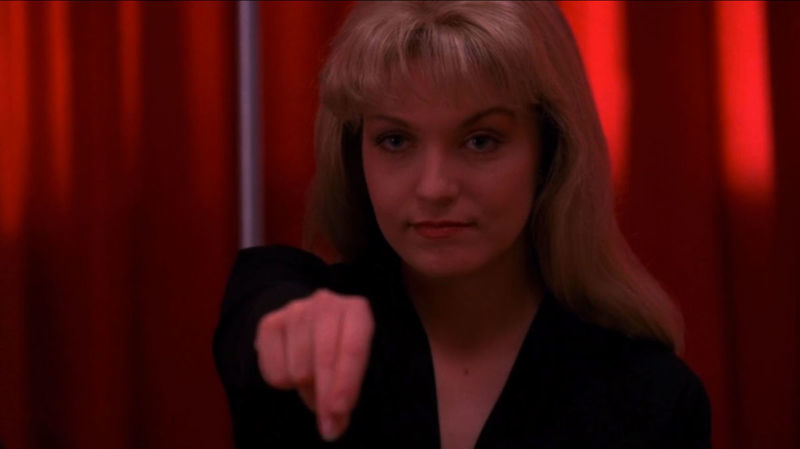
"Twin Peaks" returns; Is Cancellation Bear unbearable?; Richard Kelly on "Gone Girl"; MZS on "American Horror Show"; Remembering Geoffrey Holder.

Brian De Palma talks about his new film "Passion," his long career and seeing one of his most famous films, "Carrie," get a remake.
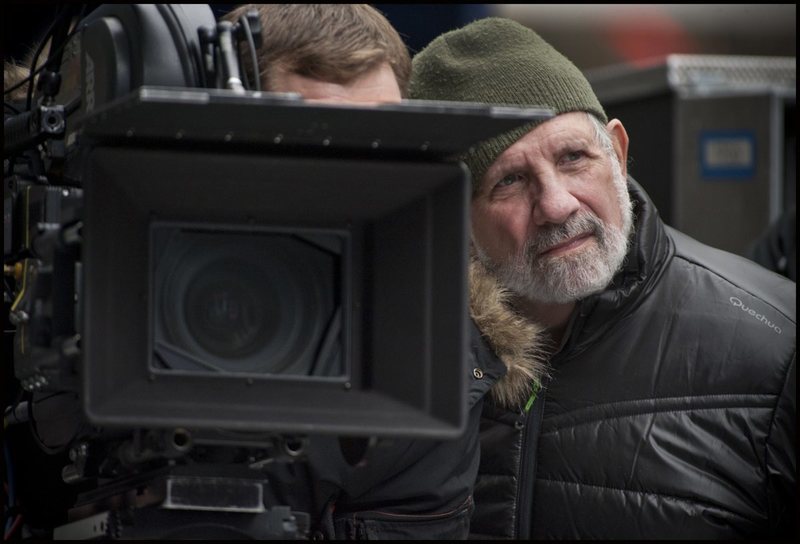
Peter Sobczynski ranks 27 films by Brian De Palma.
Streaming on Netflix Instant
"Carrie" (1976) was based on standard horror material but became memorable thanks to Brian De Palma's ability to keep an audience unnerved every step of the way. Think for a moment of the nature of telekinesis, the film's supernatural gimmick. The ability to mentally transport things is surely not as intriguing or frightening as the gifts of other Stephen King characters, but the director seems to realize that once the public buys it, he can then take liberties and add it to other dimensions related to the protagonist's fears and obsessions. That's s what made the picture unsettling. Some of the De Palma's other films have felt more like exercises in movie craftsmanship ("Body Double," "Raising Cain," "Snake Eyes") but this particular story lent itself particularly well to his usual directorial traits and they felt fresher at this stage of his career.

• "The Rack" (1956) • "Until They Sail" (1957) • "The Prize" (1963) • "Tales of Tomorrow: Ice From Space" (1953)"The Rack," "Until They Sail" and "The Prize" are now available on made-to-order DVD from the Warner Archive Collection for $19.95 each. "Tales of Tomorrow" can be viewed on Hulu Plus and Amazon Instant Video.
by Jeff Shannon You would think that every film Paul Newman ever appeared in would be readily available on home video, right? Guess again. One of the best films from Newman's early career has managed to slip through the cracks of home-video distribution for decades, and unless you're old enough to have seen it in theaters or on TV over the years, it's possible you've never even heard of it. So when I heard that "The Rack" (1956) was available on home video for the very first time, I couldn't wait to break the news to Stewart Stern.
For anyone who's wondering "Stewart who?" there's a convenient shortcut you can use when discussing the impressive life and career of Stewart Stern. All you have to say is, "He wrote 'Rebel Without a Cause.'" Uh-huh, that one. With a credit like that, any screenwriter could legitimately claim a slice of movie immortality, like James Dean did as the now-iconic star of Nicholas Ray's 1955 teen-angst classic. But to say that Stern only wrote "Rebel" is a bit like saying Frank Lloyd Wright designed a house. In the course of his distinguished, decades-spanning career, Stern wrote rich, psychologically perceptive scripts that were magnets for great actors and great acting: His script for "The Ugly American" (1963) gave Brando plenty to chew on; his Oscar-nominated script for "Rachel, Rachel" (1968) gave Joanne Woodward what is arguably the best role of her career (under the direction of her husband, Paul Newman; they also earned Oscar nods); and Stern's Emmy and Peabody-winning teleplay for "Sybil" (1976) transformed cute TV actress Sally Field into an Emmy winner with a pair of Oscars in her future. A few years later, Stern left Hollywood, weary of the rat race and struggling with writer's block, the delayed effect of post-traumatic stress from service in World War II. In the mid-'80s, Stern relocated to Seattle and never looked back. And while Stern may have been a nephew of Paramount Pictures founder Adolph Zukor, with additional family ties to MGM moguls Arthur Loew Sr. and Jr., his closest Hollywood connection was more personal and more warmly indicative of the man's soul and spirit: For 55 years, Stewart Stern was one of Paul Newman's very best friends.
Marie writes: Yarn Bombing. Yarn Storming. Guerilla Knitting. It has many names and all describe a type of graffiti or street art that employs colorful displays of knitted or crocheted cloth rather than paint or chalk. And while yarn installations may last for years, they are considered non-permanent, and unlike graffiti, can be easily removed if necessary. Yarn storming began in the U.S., but it has since spread worldwide. Note: special thanks go to Siri Arnet for telling me about this cool urban movement.
Marie writes: In a move which didn't fail to put a subversive smile on my face, works by the mysterious graffiti artist Banksy began to appear recently in Hollywood as Academy Awards voters prepared to judge Exit Through the Gift Shop, which is up for best Documentary. (Click to enlarge.)
The most controversial thus far was painted on a billboard directly opposite the Directors Guild of America HQ on Sunset Boulevard. A poster advertising The Light Group (a property, nightclub and restaurant developer) was stenciled over with images of a cocktail-guzzling Mickey Mouse grasping a woman's breast. As it was being removed, a scuffle broke out between workmen and a man claiming the poster was his "property" - presumably triggered by the fact that an authentic piece by Banksy is worth thousands. To read more visit Banksy targets LA ahead of Oscars at the Guardian. And to see more pictures go HERE.
Behold a most wondrous find...."The Shop that time Forgot" Elizabeth and Hugh. Every inch of space is crammed with shelving. Some of the items still in their original wrappers from the 1920s. Many goods are still marked with pre-decimal prices."There's a shop in a small village in rural Scotland which still sells boxes of goods marked with pre-decimal prices which may well have been placed there 80 years ago. This treasure trove of a hardware store sells new products too. But its shelves, exterior haven't changed for years; its contents forgotten, dust-covered and unusual, branded with the names of companies long since out of business. Photographer Chris Frears has immortalized this shop further on film..." - Matilda Battersby. To read the full story, visit the Guardian. And visit here to see more photos of the shop and a stunning shot of Morton Castle on the homepage for Photographer Chris Fears.
Welcome to a special Halloween edition of the Newsletter! Marie writes: the Cimetière du Père-Lachaise in Paris is considered one of the most beautiful cemeteries in the world, in addition to being the final resting place of many a famous name. From Édith Piaf, Sarah Bernhardt and Chopin to Oscar Wilde, Jim Morrison and Georges Méliès, the well-known sleep on the tree-lined avenues of the dead and which you can now explore in a virtual 360 degree tour...
ENTER Père-Lachaise
There are great movies and there are others which can only be described as special; movies with philosophies we can't help but apply to our daily lives. Robert Rossen's "The Hustler" for me is such a movie.
A film with a great, main subject (pool) that is secondary in importance to character. A film with unforgettable characters who have unforgettable names. A film with more classic lines than you can count. A film that made me feel disappointed about the hero over and over until the moment arrived when I couldn't feel any prouder.
It has four great performances: Paul Newman, George C. Scott, Jackie Gleason and Piper Laurie, all in top form and all four nominated for Oscars.
Godard is a contemptuous artist, too. Forget "Le Mepris." Ever see "Weekend"?
We heard a lot in 2006, as we do every year, about nasty filmmakers who were said to have viewed their characters (and, hence, their audiences) with contempt, or who "made fun of" them, or treated them with condescension, or who just don't seem to like them very much. Across time, such charges have been leveled at Stanley Kubrick, Robert Altman, Christopher Guest, the Coen Bros., Todd Solondz, Sacha Baron Cohen, and many other artists -- especially those whose work has tended toward the comic or caricaturish. And then there's all of film noir to consider, a whole kind of moviemaking that does not view the human animal with kindness or affection.
In answer to specific allegations of of alleged contempt (such as Jonathan Rosenbaum's characterization of Altman's attitude toward Lady Pearl in "Nashville"), I have tried to explain why I think such charges are false, or at least misguided. It seems to me, in these cases, that the contempt being expressed is more likely to be that of the critic for the director or film (or reader) than that of the director for the character or the audience (unless we're talking about a movie by, say, Alan Parker). But it's impossible (and futile) to argue with a blanket statement like: "The Coens mock everybody. They're laughing at the audience!" -- meaning, of course: "They're laughing at me!" (please read in the voice of Piper Laurie in "Carrie"). My response is: 1) that's a rather vague aspersion; 2) if you got the joke you wouldn't feel like you were being laughed at; and, 3) yeah, it's true. Many forms of comedy -- satire, parody, etc. -- contain an element of mockery. Even contempt.
So, I'm here to speak up for contempt! (How very contrarian of me!)
The rich, powerful and pretentious are obvious (and ripe) targets for humor and derision. Their problem is that they're just people, with flaws like everybody else, only magnified (and made more irritating and dangerous) by their position in society. They deserve to be knocked down a few notches. But you don't have to be rich, powerful or pretentious to be a hypocrite, or a boor, or a twit, or an oaf, or a cretin. You don't have to possess great wealth or celebrity or influence to be smug, stupid, petty, ignorant, pathetic, tasteless, crass, callous, crude, or just downright annoying -- and, thus, worthy of comic derision. Such people really exist! I've seen them with my own eyes! What's more, I've been them!
"Hey, look at those assholes over there. Ordinary f----in' people. I hate 'em." -- Bud (Harry Dean Stanton), "Repo Man" (1984)
"Hell is other people." -- Jean-Paul Sartre, "No Exit" (1944)
I sometimes wonder if those who worry about expressions of contempt for characters (particularly "ordinary people") in movies have ever had jobs in which they had to deal with the general public. Or have ever attended some kind of party or social function at which they have met some people they would rather not have met. Is this not part of the human experience? Don't most people have some pretty awful qualities? Why should an artist be expected concentrate on their benign or "sympathetic" traits -- or to come up with some kind of artificially "fair and balanced" view of them? Some people's most interesting characteristic is that they are idiots. Or worse. Did you like "Seinfeld"? Those characters were despicable in every way. Some people thought that was why they were funny.
Is misanthropy not the most universal and understandable of all sins? For all our achievements and evolutionary refinements, we are a pretty damnable species. And, as the only one capable of (and perhaps unwittingly committed to) destroying all life on our own planet, we are also the richest, most powerful and pretentious. Don't we deserve to have a laugh at ourselves -- or, at least, at those idiots right over there?
P.S. I am reminded of the words of Luther Ingram and Mack Rice, as sung by the incomparable Mavis Staples (and, yes, I'm going through one of my periodic obsessive Stax phases, so get used to it):
Keep talkin' 'bout the president won't stop air pollution Put your hand over your mouth when you cough, that'll help the solution
Mavis means you. And she's singing in the context of a Christian family gospel/soul group. Good gosh a'mighty, now -- even the Staple Singers aren't afraid to make the average person the butt of an occasional, rather contemptuous, joke. Amen to that.
View image Look back in Angora: An Ed Wood moment between Josh Hartnett and Scarlett Johansson in Brian De Palma's "The Black Dahlia."
In anticipation of Brian DePalma's "The Black Dahlia," which premiered at the Venice Film Festival to bi-polar reviews and opens in the US September 15, a number of sites are celebrating the modern master of the rapturous moving camera. (See De Palma a la Mod for all the latest on De Palma and the Dahlia.) Dennis Cozzalio has an excellent round-up of who's doing what at Sergio Leone and the Infield Fly Rule, and adds his own illuminating thoughts to the heady mix. (And don't forget to check out his Opening Shots submission for De Palma's "Femme Fatale" here at Scanners.)
Peet Gelderblom also has some good stuff about the "unofficial De Palma blogathon" at Lost in Negative Space. And I finally took the advice of That Little Round Headed Boy and caught up with De Palma's much-maligned "Mission to Mars," which has moments of astonishing beauty and suspense, despite being hobbled by a terrible script (original screenwriters joined by an ampersand; re-writer Graham "Speed" Yost tacked on with an "and") and one of the most lifeless performances I have ever seen from Connie Nielsen. (How could she not have been fired after the first day? She's heavier-than-leaden in almost every single moment she has on screen -- except the marvelous weightless dance sequence to [and you have to appreciate the humor] Van Halen. Other than that, like a Martian tornado she sucks.) De Palma is a terrific director of women (Margo Kidder, Sissy Spacek, Piper Laurie, Betty Buckley, Amy Irving, Carrie Snodgress, Nancy Allen, Angie Dickinson...) but Nielsen is really Not of This Earth. (TLRHB also features some informative comments about "Mission to Mars," including a link to Matt Zoller Seitz's round-up of reviews, from pans to raves.)
I've said this many times before about De Palma, but give this guy a decent screenplay and he can work wonders. Look what he can do even when he doesn't have one. So, give the guy a good script, already!
To understand the special gift of John Frankenheimer, it is better to start with his stories instead of his movies. Yes, he made some of the most distinctive films of his time (and began and ended as one of the most gifted directors of drama on television) but the films were mostly serious, and Frankenheimer was a very funny man.
People have been asking me if I've seen "The Critic," ABC's new animated series. Maybe they think I can identify with the hero, a critic named Jay Sherman who reviews movies on television and has certain points of similarity with Gene Siskel and me: He's bald, and he has a Pulitzer.